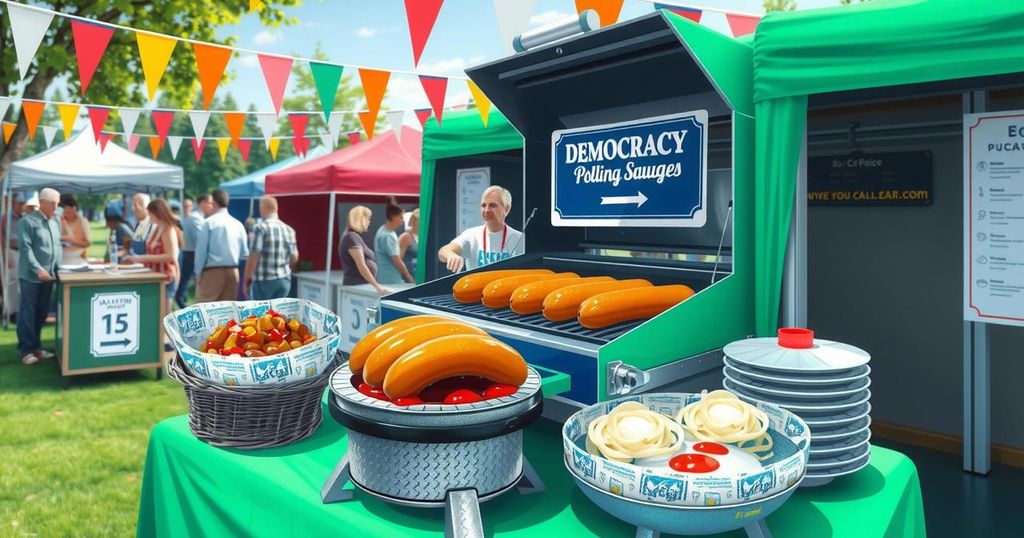The democracy sausage, a simple sausage in bread served on election day, is a beloved tradition in Australia symbolizing civic engagement. With a history dating back to bake sales, it is now a significant fundraising event for community groups, expected to appear at polling places worldwide. The website democracysausage.org tracks sausage availability and has become a key resource for voters, highlighting the cultural importance of this phenomenon and its connection to the democratic process.
WELLINGTON, New Zealand — At polling places across Australia, citizens were not just fulfilling their civic duty this past Saturday; they were indulging in a beloved tradition known as the “democracy sausage.” This culinary treat, comprising a grilled sausage nestled in a slice of white bread, often garnished with onions and ketchup, has become as quintessentially Australian as the koala or Vegemite. For many, enjoying this snack on election day holds a significance that rivals casting their vote itself.
When served at polling places, the ordinary sausage transforms into a “democracy sausage,” symbolizing electoral participation with a light-hearted twist. One website that tracks real-time locations of democracy sausages even cheekily notes, “It’s practically part of the Australian Constitution.” Yet, while it carries a sense of political significance, the tradition is fundamentally centered around fundraising, with school and community groups benefiting from this popular event.
Australia’s democracy sausage can be found at virtually all polling locations. From Australian embassies in New York and Tokyo to a research station in Antarctica, the tradition has truly gone global. Prior to Saturday’s ballot, these sausage sizzles were anticipated to be present everywhere citizens could vote, reinforcing its role as a unifying culinary experience.
The initiative behind the popular website democracysausage.org began in 2013. Spokesperson Alex Dawson and his colleagues, who were initially frustrated with the lack of information regarding food availability at polling stations, have created a resource that details not only sausage options but also gluten-free, vegan, and halal alternatives. It can get busy on election day as volunteers monitor submissions regarding stalls and keep voters informed about sausage availability. “We’ll usually rope in a few friends to keep an eye on incoming submissions,” said Dawson. It is also tradition for volunteers to enjoy their own democracy sausages during a break.
In 2022, the site reported that 2,200 of Australia’s 7,000 polling places offered democracy sausages, earning $4.1 million Australian dollars (about $2.6 million USD) in profits. Tropical climate areas set the stage for barbecue grills, leading to an increased popularity of these tasty treats and giving many groups essential funds each election year.
The origins of the term “democracy sausage” remain a mystery. Judith Brett, a professor at LaTrobe University, explained that fundraising snacks have been sold at polling places for nearly a century. The trend shifted from bake sales in the 1920s to sausage sizzles in the 1980s, enabled by the rise of portable grills. She notes, in part, the tradition’s success stems from the Australian voting system, which mandates Saturday voting, leading to high turnout rates above 90%.
Brett also pointed out that these snags resonate with the Australian sense of humor. “It was a bit of a joke,” she stated. This is not a government initiative or a clever slogan from political parties, but rather a grassroots cultural aspect that fosters shared experience among voters.
The sausage’s political significance cannot be overlooked. It provides a way for politicians to connect with voters, displaying their relatable side by enjoying a simple meal. Yet, this has led to some amusing moments which have turned into memes and light-hearted political anecdotes. “It has been a way… of connecting a younger generation, a social media generation, into the civic rituals of election day,” Brett added.
Concerns regarding early voting impacting democracy sausage sales have been raised, especially as over 4 million Australians have opted to vote ahead of election day, a record high. However, Dawson remains optimistic as early voters can still delight in this tradition on the big day. He noted that even tourists and international students are drawn to polling places for a sample of Australian culture. “I think that’s a great piece of Australian culture for people to take home with them,” he said.
In summary, the democracy sausage has evolved into a cherished symbol of electoral engagement in Australia, cherished by both locals and visitors alike. Far more than just a simple snack, it represents community spirit and offers fundraising opportunities for many groups. While early voting raises questions about the sausage’s future, it remains a significant part of the Australian voting experience, emphasizing the connection between citizenship and cultural traditions.
Original Source: www.newsday.com






